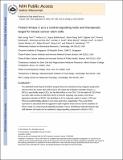Protein Kinase C α Is a Central Signaling Node and Therapeutic Target for Breast Cancer Stem Cells
Author(s)
Lu, Haihui; Buikhuisen, Joyce; Soh, Boon Seng; Lim, Elgene; Reinhardt, Ferenc; Wu, Zhenhua Jeremy; Krall, Jordan A.; Bierie, Brian; Guo, Wenjun; Chen, Xi; Liu, Xiaole Shirley; Brown, Myles; Lim, Bing; Tam, Wai Leong; Weinberg, Robert A; ... Show more Show less
Downloadnihms569426.pdf (2.295Mb)
PUBLISHER_CC
Publisher with Creative Commons License
Creative Commons Attribution
Terms of use
Metadata
Show full item recordAbstract
The epithelial-mesenchymal transition program becomes activated during malignant progression and can enrich for cancer stem cells (CSCs). We report that inhibition of protein kinase C α (PKCα) specifically targets CSCs but has little effect on non-CSCs. The formation of CSCs from non-stem cells involves a shift from EGFR to PDGFR signaling and results in the PKCα-dependent activation of FRA1. We identified an AP-1 molecular switch in which c-FOS and FRA1 are preferentially utilized in non-CSCs and CSCs, respectively. PKCα and FRA1 expression is associated with the aggressive triple-negative breast cancers, and the depletion of FRA1 results in a mesenchymal-epithelial transition. Hence, identifying molecular features that shift between cell states can be exploited to target signaling components critical to CSCs.
Date issued
2013-09Department
Massachusetts Institute of Technology. Department of Biology; Ludwig Center for Molecular Oncology (Massachusetts Institute of Technology)Journal
Cancer Cell
Publisher
Elsevier
Citation
Tam, Wai Leong et al. “Protein Kinase C α Is a Central Signaling Node and Therapeutic Target for Breast Cancer Stem Cells.” Cancer Cell 24, 3 (September 2013): 347–364 © 2013 Elsevier Inc
Version: Author's final manuscript
ISSN
1535-6108